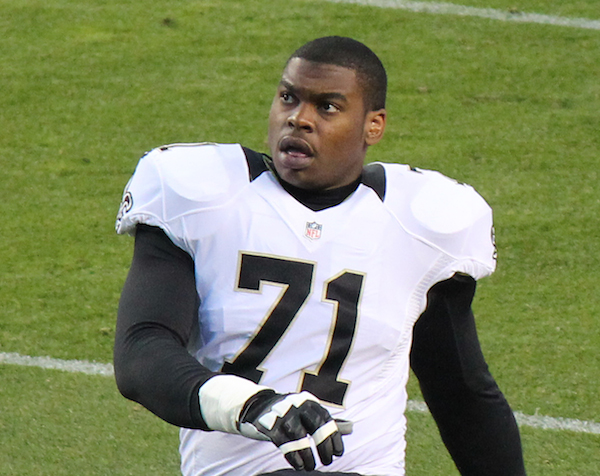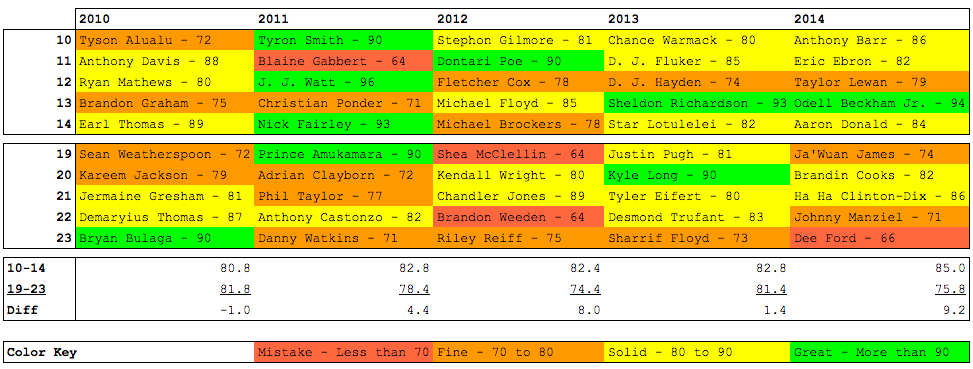Now that we’re almost at the end of the NFL regular season, there are a few things we know for sure. One of those things is that the winner of the NFC South division, a team guaranteed to make the playoffs, is going to have a losing record. That they will make the playoffs having won only half their games or fewer can be seen in a trillion different ways, from luck to fair to an abomination. I reached out to my old friend and sometimes collaborator, Dean Russell Bell, to find out what he thought about this. What follows is our unadulterated but safe for work (at least it’s safe if your job doesn’t mind you reading about the NFL in the office) email exchange. This is part two of a two-part journey. If you didn’t read part one, you can find it here.
Ezra,
Let me first say how happy I am that a site like Muthead exists SOLELY to provide information on Madden player ratings. Is this a great sports country or what?
That’s a lot of numbers. And a somewhat limited sample size and one that’s reliant on…you know…video game ratings (which are based on stats, yeah yeah yeah. Still. Really?) It also doesn’t include relative salary cap impact of picks in those slots (which, I’ll admit, I’m not entirely clear on) which would be the other thing to take into consideration. And I won’t point out that four of the six teams with a great pick in the 10-14 slot are likely to miss the playoffs this year. Or maybe I will.
But to me, that all misses the point. If I’m a fan – maybe not the die-hardiest of die-hard fans who actually analyze their teams’ salary caps – I’ll still take the playoff game. Again – are you more likely to get a better player with a higher draft pick? Yes. But this is not the top five, where you get the “can’t miss” franchise quarterback (even though they frequently miss). So as a fan…I’m not as moved by it. I’m more about the short term excitement.
And if I’m a franchise, you have to take that into consideration. No coach wants to miss the playoffs. Tanking does not seem to be a thing in football like it is in basketball. Why is that? I don’t really know…but I suspect it has something to do with how big a crapshoot it all is.
BUT. I will not let all these numbers and colors distract from the fundamental question: is it fair for a team with a worse record to make the playoffs because they won a division?
Dean
— — —
Dean,
Fairness in sports is something I have a lot of trouble thinking about. Yes, it’s fair because in the constructed universe of the NFL, the rules dictate that the 32 teams are broken up into two conferences of 16 teams each and the conferences are broken up into four divisions of four teams each and the team with the best record in each division is guaranteed a playoff spot. Whichever team wins the NFC South, the Saints, Panthers, or Falcons, did not do anything untoward (at least not that we know of) or outside of the rules as they are today. The question is, is the rule fair? That’s when things start to get very scrambly in my head but let me try to make some kind of sense out of them… or at least an omelet.
If fair means optimized to reward the best teams, then it’s safe to say this is not a “fair” rule. You could easily design a fairer system by this definition of the word fair by eliminating divisions or even conferences entirely. Why not just have the top 12 of the 32 teams make the playoffs? Divisions, and even conferences, exist for reasons other than rewarding the best teams. Divisions exist mostly for fans. Having three teams that your team plays twice a year (as they do within divisions) helps create the type of contentious long-term rivalries that fans love like the Baltimore Ravens vs. the Pittsburgh Steelers, the San Francisco 49ers vs. the Seattle Seahawks, and virtually every combination of the teams in the NFC East, the Philadelphia Eagles, Dallas Cowboys, New York Giants, and Washington Redskins. Divisions are definitely not fair if fair means optimizing to reward the best teams, but they might be fair if fair means creating the most enjoyable product for fans of all 32 teams.
If fairness in sports is about serving the fans, then I would argue that this does serve the fans. Oh, sure, fans of the team that misses out on the playoffs despite having ten wins will be pissed, but overall, I think it’s a good thing. If playoff spots were given out simply to the best 12 teams in the league, the playoff race would basically only include the teams in ninth through fifteenth place overall — say around seven teams. By rewarding division winners and thus limiting the playoff spots given to non-division winning good teams, the NFL increases the number of teams in contention for the playoffs (and at risk for falling out). In a world without divisions, the Detroit Lions, Green Bay Packers, and Seattle Seahawks wouldn’t care so much about their final two games of the season as they do today. They would be in fourth, fifth, and eighth place respectively and comfortably in the playoffs. But because divisions matter, each of these teams could miss out on a playoff spot if they don’t win. Similarly, in a world without divisions, we wouldn’t care so much about games involving the three teams fighting for the NFC South title — the Falcons, Saints, and Panthers would be in 21st, 23rd, and 24th place and well out of the playoff hunt.
The NFL’s division based playoff system is fair if you consider the NFL to be first and foremost entertainment for fans. That’s good enough for me. What about you?
Ezra
— — —
Ezra,
Good enough for me too, even though I’m going to watch some under-.500 NFC South take a playoff spot that could’ve belonged to my swan-diving Eagles. Because the NFL should, first and foremost, satisfy the fans. We’re the ones who pay for the whole thing.
Now, it would be unfair if winning a division was the only way to make it into the playoffs – but every team has an equal opportunity to win one of the wild cards and, in the case of my Eagles, that was very much within their grasp. The didn’t deserve to be in the playoffs. And they’re not. So that’s fair. And as you note, the current arrangement made this week of football far more entertaining than it would otherwise have been.
The other question is whether it’s fair that a division winner automatically gets homefield advantage in the first playoff game despite having a worse record than their opponent. And again – I think it is. The NFL has decided – for the reasons you cited – to give preferential to teams that win their division. While some divisions may be more talented overall in a given year, I’d argue that it the balance of power shifts often enough that it roughly evens out. After all, it was only a few years ago – before Jim Harbaugh, Pete Carroll, and Chuck Arians – that we were talking about how anemic the NFC West was, especially compared to the powerhouse NFC South.
Dean
— — —
We decided to leave it here. What comes around, goes around. Everything has happened before and will happen again. And more cliches. Until the next time, have a happy and safe holiday season!


